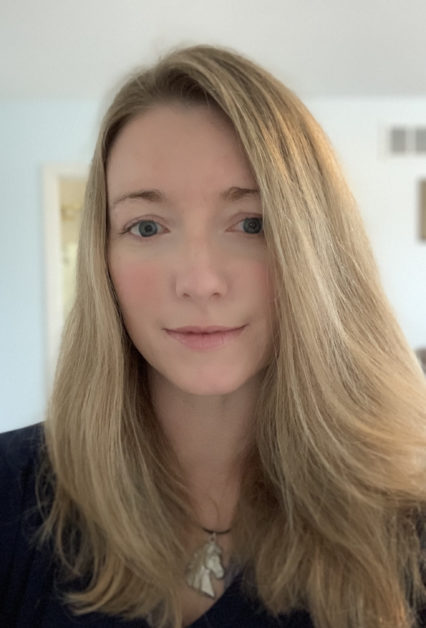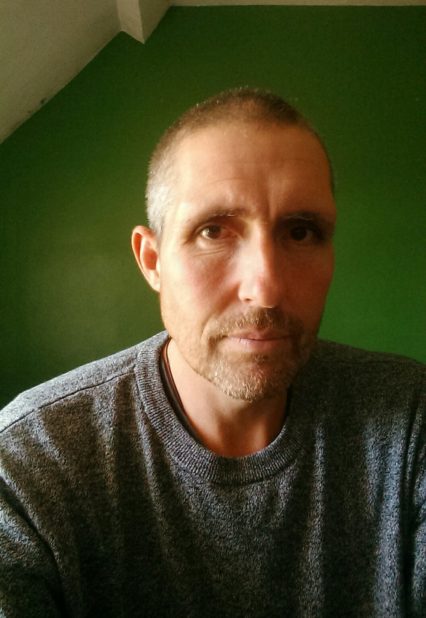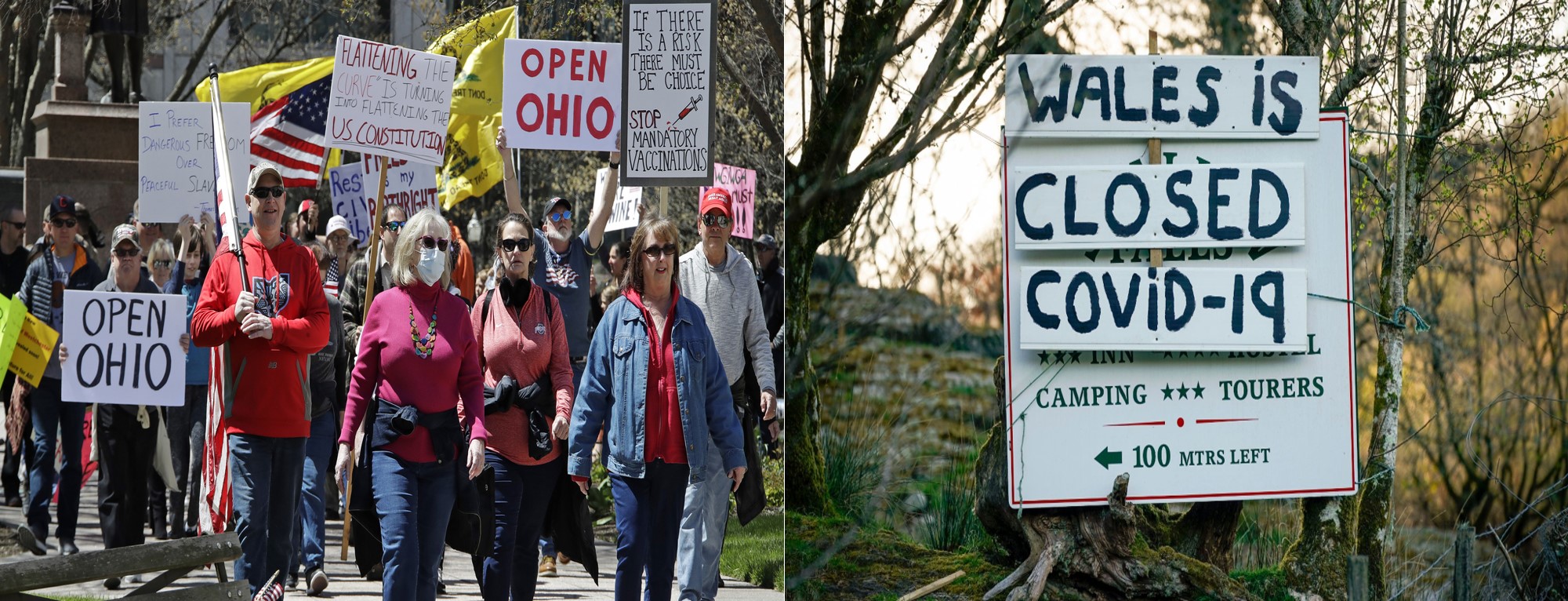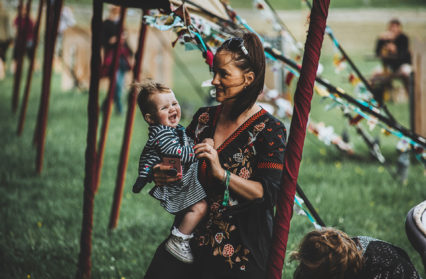From lockdown in Wales and America, Kristian Evans and Zoë Brigley discuss possibilities for life after COVID-19. If we really want change, can we rely on Westminster and the White House, or should we look to the grassroots? What connections need to be made between social and ecological issues? And what role will the arts play in the future world that we want to create?

Zoë Brigley: So, we’re thinking about life after COVID-19 in very different contexts: you in Wales, and me in the American Midwest. One parallel I notice is protesters demanding the lockdown be ended. I see there was a protest in Hyde Park in London this week, and protests have happened in Ohio and neighboring states regularly. In London, a protester described COVID-19 as a “fake virus”, and here in Columbus, one protester was photographed carrying an anti-Semitic sign framing Jewish people as the “real virus,” which was so appalling and disgusting.
Just recently, in our neighboring state of Michigan, armed protestors entered government buildings to challenge Democratic Governor Gretchen Whitmer’s stay-at-home order. Whitmer has been a potential running mate for presidential hopeful Joe Biden, and so is a target for Republican ire with elections looming. A woman who has openly talked about experiencing sexual violence has had armed and aggressive protesters calling to “lock her up,” just for trying to re-open the state from lockdown with the least possible harm.
One thing I hope Americans take from the lockdown is recognising who is actively harming others. And don’t tell me that it’s about protecting the economy or the unemployed, because we could do that without putting the most vulnerable people in the way of infection. We have to admit that certain groups and some politicians value the economy more than people’s lives, and we should take note of who they are and remember.
Kristian Evans: Yes, those pictures were shocking, but we seem to be consistently lowering the bar these days, new low after new low. People vote against their own interests, as we know. Facts don’t change minds: imagination does, emotion does. Lies and fears dominate the headlines and control the narrative. The unconscious decides and then the mind later justifies and rationalises. It seems that what we need is a story, a powerful myth that gives our lives meaning and significance. We’re not rational creatures. Far from it.

Here in Wales, we’ve suffered from inert leadership and association with Westminster, which ignored global evidence and let the virus spread. Deaths here have been among the highest in Europe. The military and imperial imagery is already being rolled out to distract from the disaster. And many people here seem to think we will somehow get back to normal. But what was normal? Precarious work, low wages, austerity, disaster capitalism? A system recklessly overstretched to achieve maximum efficiency turns out to be completely vulnerable to shocks. It has no resilience at all.
And we are entering a period when shocks are the new norm. Climate change, mass extinction and ecosystem collapse: get used to it. Ocean ecosystems are in such a ragged state that they could literally collapse tomorrow. The consequences of such an event are almost unimaginable but these things are now in play. We need deep local and state resilience and flexibility in order to be prepared for further and harder shocks or we will repeat this COVID-19 fiasco again and again. But with a Tory majority in the UK, and a likely second term for Trump in the US, it seems we will be forced to organise to protect ourselves at grassroots level. Maybe this is not necessarily a bad thing.
Zoë Brigley: What do you imagine grassroots organising looking like post COVID-19? There is successful organising in the Midwest around social justice issues, but Extinction Rebellion (XR) has not taken off in Ohio in a significant way. The UK perches on the edge of the Atlantic Ocean battered by floods and storms, but in Ohio, things carry on as they always have with the occasional tornado and some stretches of blistering or freezing weather.
Right now we are impacted by COVID-19 like everyone else in the world. It’s a terrible cost. People are dying. People are losing loved ones. But if we have to live through it, could it also be a time for awakening?
Kristian Evans: Yes, that has to be the hope. This is one of those rare moments where we get to step outside of the spectacle and pause and look around, breathe and think. Wipe the tears from our eyes. What’s real? What really matters? What have we been doing? The values of Empire still dominate our society: class hierarchy, enforced scarcity, constant expansion and exploitation. Gandhi famously distinguished between two types of authority, “one is obtained by fear of power and the other by acts of love.” Can we reinvent our political system so that it supports ecologically sensitive behaviours based on cooperation, sharing and nonviolence?
So grassroots organising means education, mutual aid, community groups, citizen’s assemblies, permaculture, experimental zones and initiatives, intervention and disruption. XR have been remarkably successful in making the ecological crisis unignorable, but what next? Buckminster Fuller: “You never change things by fighting the existing reality. To change something, build a new model that makes the existing model obsolete.” That’s the scale of our moment, it seems to me.
We either find a way to create a future of mutual abundance or we crash in a way that will make this COVID-19 shock seem small. The scale of the challenge is on a par with that faced by the chartists, or the suffragettes; it will require a response from us of similar imagination, commitment and energy. Are we up to it?
Zoë Brigley: Maybe we need connectedness between activists. We have to spend so much energy correcting social problems – their violences and traumas. But ecological problems are very relevant to social problems too. Slavery built Western economies and is closely linked to what Donna Haraway calls the “plantation-ocene,” an era that has decimated ecosystems, promoted monocultures, and put money before people and living things. So I guess I’m saying that the fight to stop rape culture, to prevent police brutality against BAME people, to end mistreatment of immigrants, to refuse abuses of LGBTQ+ people – all this has links with ecologies, because when ecocatastrophe happens, it’s the least privileged who suffer the most.

Kristian Evans: Ecological thinking and social justice are deeply linked. “We can’t solve problems by using the same kind of thinking we used when we created them.” Another aspect of this is that our subjectivity is, to a large extent, manufactured by the media. Which for many of us these days means Facebook, basically. This makes us extremely easy to manipulate, as the Cambridge Analytica scandal showed. We don’t really value critical thinking anymore. It’s as if we’re losing the ability to question the information we receive. Most journalists seem to simply repeat whatever they are told by the authorities.
You know, as someone self-educated, who didn’t go through the university system, I’m often intrigued by how the humanities and the arts have settled into a secondary role. Why is this? Is it because many academics accept a scientific materialist worldview, tacitly relegating in importance the supposedly ‘soft’ subjective arts in relation to the ‘hard’ objective sciences? The soft subjects study ephemera, illusions – so the theory goes – whereas the hard subjects study the real world.
It’s remarkable too how many of my friends and colleagues, grassroots activists both within and beyond XR, can be said to be “spiritually motivated,” for lack of better words. They’ve actually discarded this inherited materialism and embraced a vision of a re-enchanted cosmos, often informed by deep ecology and the worldviews of traditional societies. This has helped motivate them to act. It’s a noticeable shift. All life is considered sacred and rich with meaning and purpose. Separation is an illusion; the universe is conscious, alive…and occasionally extremely weird! I don’t think this is a retrograde step. I think it represents a new sophistication. And it places the arts right at the beating heart of our existence. It’s something I think about a lot these days.
Zoë Brigley: This is why I find myself turning to poetry. In The Gift, Lewis Hyde frames poetry as something that can’t be easily marketed and sold, and he cites an old Welsh belief that bread from the faeries had to be eaten on the day it was given or it would turn into a toadstool! In other words, poetry is not something that can be hoarded for profit.
We could build our new world with the spirit of the gift, of the poem. We find that spirit in poems like Aimee Nezhukumatathil’s ‘Self-portrait as C-section Scar’ as it praises and cherishes the hagfish as well as mothers’ bodies. Or take Romalyn Ante’s ‘Unbecoming Maramot,’ where the tale of Maramot “the selfish giant” contrasts with a nurse’s loving care of patients during the pandemic.
We are already creating a new world in lockdown in Wales and the US through acts of kindness and compassion. We help each other survive, and we connect online while our friends with dis/abilities remind us of how important accessibility has been all along. We need a culture of giving, not consumption. Lewis Hyde compares the gift/the poem to Eros, because love does not take anything away, but offers “a constantly flowing river,” always giving and receiving.
Kristian Evans and Zoë Brigley | Life After Covid
Zoë Brigley is a poet, nonfiction writer, and anti-violence academic, currently Assistant Professor at the Ohio State University. Kristian Evans is a poet, nonfiction writer, and environmental activist from Kenfig in Wales. Together with Rob A. Mackenzie, they will be editing Magma Poetry 79 on the subject of “Dwelling,” with a call for submissions in June.
(Header photo credit: Nathan Roach / Coal Poet Photography)












